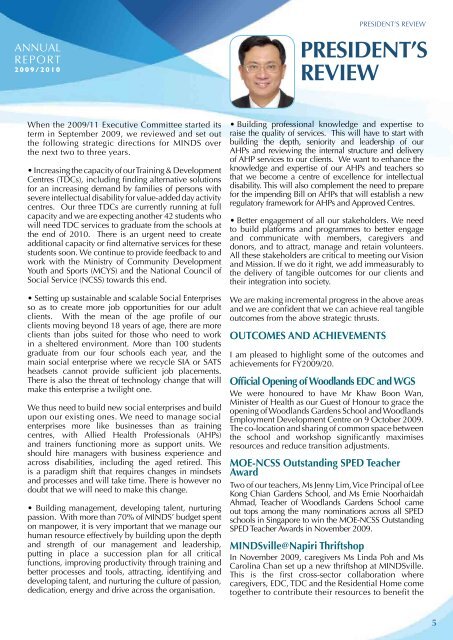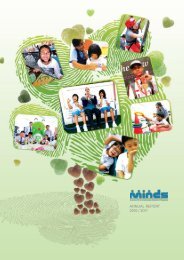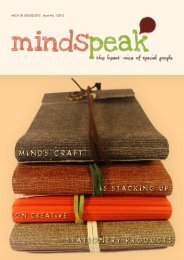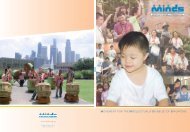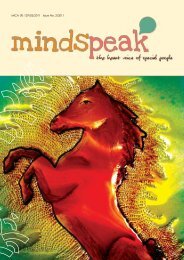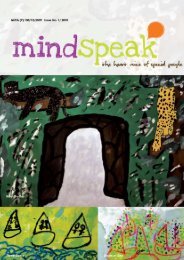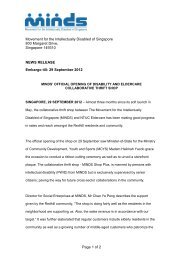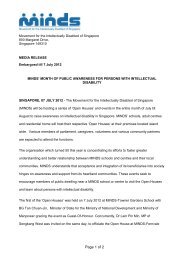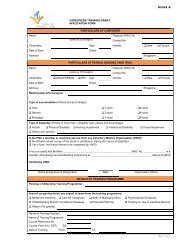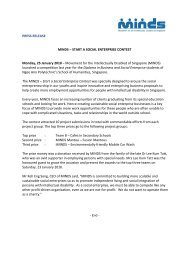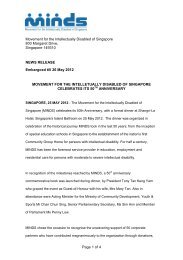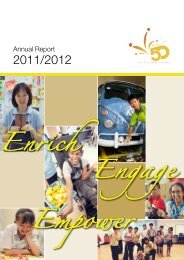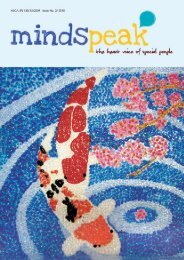2009/2010 - MINDS
2009/2010 - MINDS
2009/2010 - MINDS
You also want an ePaper? Increase the reach of your titles
YUMPU automatically turns print PDFs into web optimized ePapers that Google loves.
ANNUAL<br />
REPORT<br />
2 0 0 9 / 2 0 1 0<br />
PRESIDENT’S REVIEW<br />
PRESIDENT’S<br />
REVIEW<br />
When the <strong>2009</strong>/11 Executive Committee started its<br />
term in September <strong>2009</strong>, we reviewed and set out<br />
the following strategic directions for <strong>MINDS</strong> over<br />
the next two to three years.<br />
• Increasing the capacity of our Training & Development<br />
Centres (TDCs), including finding alternative solutions<br />
for an increasing demand by families of persons with<br />
severe intellectual disability for value-added day activity<br />
centres. Our three TDCs are currently running at full<br />
capacity and we are expecting another 42 students who<br />
will need TDC services to graduate from the schools at<br />
the end of <strong>2010</strong>. There is an urgent need to create<br />
additional capacity or find alternative services for these<br />
students soon. We continue to provide feedback to and<br />
work with the Ministry of Community Development<br />
Youth and Sports (MCYS) and the National Council of<br />
Social Service (NCSS) towards this end.<br />
• Setting up sustainable and scalable Social Enterprises<br />
so as to create more job opportunities for our adult<br />
clients. With the mean of the age profile of our<br />
clients moving beyond 18 years of age, there are more<br />
clients than jobs suited for those who need to work<br />
in a sheltered environment. More than 100 students<br />
graduate from our four schools each year, and the<br />
main social enterprise where we recycle SIA or SATS<br />
headsets cannot provide sufficient job placements.<br />
There is also the threat of technology change that will<br />
make this enterprise a twilight one.<br />
We thus need to build new social enterprises and build<br />
upon our existing ones. We need to manage social<br />
enterprises more like businesses than as training<br />
centres, with Allied Health Professionals (AHPs)<br />
and trainers functioning more as support units. We<br />
should hire managers with business experience and<br />
across disabilities, including the aged retired. This<br />
is a paradigm shift that requires changes in mindsets<br />
and processes and will take time. There is however no<br />
doubt that we will need to make this change.<br />
• Building management, developing talent, nurturing<br />
passion. With more than 70% of <strong>MINDS</strong>’ budget spent<br />
on manpower, it is very important that we manage our<br />
human resource effectively by building upon the depth<br />
and strength of our management and leadership,<br />
putting in place a succession plan for all critical<br />
functions, improving productivity through training and<br />
better processes and tools, attracting, identifying and<br />
developing talent, and nurturing the culture of passion,<br />
dedication, energy and drive across the organisation.<br />
• Building professional knowledge and expertise to<br />
raise the quality of services. This will have to start with<br />
building the depth, seniority and leadership of our<br />
AHPs and reviewing the internal structure and delivery<br />
of AHP services to our clients. We want to enhance the<br />
knowledge and expertise of our AHPs and teachers so<br />
that we become a centre of excellence for intellectual<br />
disability. This will also complement the need to prepare<br />
for the impending Bill on AHPs that will establish a new<br />
regulatory framework for AHPs and Approved Centres.<br />
• Better engagement of all our stakeholders. We need<br />
to build platforms and programmes to better engage<br />
and communicate with members, caregivers and<br />
donors, and to attract, manage and retain volunteers.<br />
All these stakeholders are critical to meeting our Vision<br />
and Mission. If we do it right, we add immeasurably to<br />
the delivery of tangible outcomes for our clients and<br />
their integration into society.<br />
We are making incremental progress in the above areas<br />
and we are confident that we can achieve real tangible<br />
outcomes from the above strategic thrusts.<br />
OUTCOMES AND ACHIEVEMENTS<br />
I am pleased to highlight some of the outcomes and<br />
achievements for FY<strong>2009</strong>/20.<br />
Official Opening of Woodlands EDC and WGS<br />
We were honoured to have Mr Khaw Boon Wan,<br />
Minister of Health as our Guest of Honour to grace the<br />
opening of Woodlands Gardens School and Woodlands<br />
Employment Development Centre on 9 October <strong>2009</strong>.<br />
The co-location and sharing of common space between<br />
the school and workshop significantly maximises<br />
resources and reduce transition adjustments.<br />
MOE-NCSS Outstanding SPED Teacher<br />
Award<br />
Two of our teachers, Ms Jenny Lim, Vice Principal of Lee<br />
Kong Chian Gardens School, and Ms Ernie Noorhaidah<br />
Ahmad, Teacher of Woodlands Gardens School came<br />
out tops among the many nominations across all SPED<br />
schools in Singapore to win the MOE-NCSS Outstanding<br />
SPED Teacher Awards in November <strong>2009</strong>.<br />
<strong>MINDS</strong>ville@Napiri Thriftshop<br />
In November <strong>2009</strong>, caregivers Ms Linda Poh and Ms<br />
Carolina Chan set up a new thriftshop at <strong>MINDS</strong>ville.<br />
This is the first cross-sector collaboration where<br />
caregivers, EDC, TDC and the Residential Home come<br />
together to contribute their resources to benefit the<br />
5


